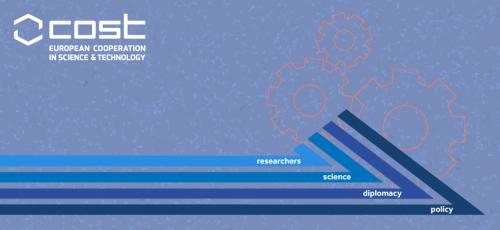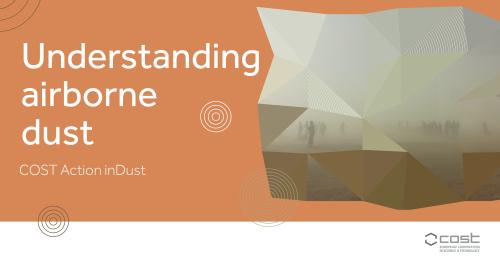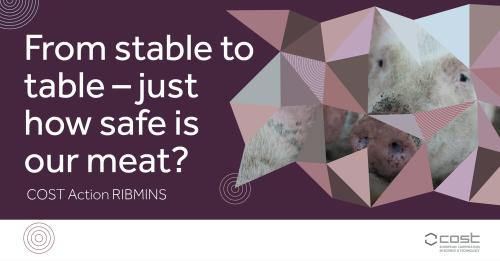Disclaimer: The views and opinions expressed in the blog articles belong solely to the author of the content, and do not necessarily reflect the European Commission's perspectives on the issue.
About COST
European Cooperation in Science and Technology (COST) is an intergovernmental funding organisation for research and innovation networks with a membership of 43 countries. Its mission is to provide networking opportunities for researchers and innovators in order to strengthen Europe’s capacity to address scientific, technological, and societal challenges. COST has been implementing its mission since 1971 by funding bottom-up, excellence-driven, open, and inclusive networks (COST Actions) for peaceful purposes in all areas of science and technology.
Yearly, COST serves a community of more than 50,000 active researchers, with different types of scientific backgrounds and diversified career pathways, in building networks that highly contribute to the free flow of knowledge and researchers and innovators in Europe and beyond. By promoting inclusive excellence, COST Actions aim to create a more diverse, equitable, and inclusive scientific community, where all members can fully develop their skills and expertise to drive impactful research and innovation.
For more information about our future strategic outlook, check out the COST Position Paper for FP10.
COST policy brief
In 2021, COST produced its first ever policy brief ‘Actions to Actions’, which includes recommendations and good practices from 10 highly successful COST Actions on how to achieve policy impact. The policy brief provides a comprehensive overview of success factors and tips covering a range of topics, including when and how to approach stakeholders, effective ways of communicating (complex) research findings relevant for policy, and the need to consider the timeliness of your messaging.
COST-JRC collaboration in the Science for Policy training sessions

Since 2022, COST has organised yearly Science for Policy training sessions for newly funded COST Actions. This training take place in cooperation with the JRC, and focuses on familiarising COST Action participants with the JRC Competence frameworks for policymakers and researchers in order to showcase the wide array of science for policy skills through collective competences researchers could use to assess their approach.
How should researchers engage with policymakers? Where and how should COST Actions share their results? How can COST Actions create policy impact? These are some of the key questions that are addressed during the ‘Science for Policy’ training. In addition to the competence frameworks, the JRC informs the participants how they can engage with and benefit from existing S4P mechanisms across the EU, which are listed in the European Commission’s ‘Science for policy’ Staff Working Document (SWD): ‘Supporting and connecting policymaking in the Member States with scientific research’.
Ending COST Actions that have created significant policy impact are invited to share their success stories and participants are invited to brainstorm what ‘stakeholder engagement’ could look like in their COST Action, identifying the following aspects:
- Which stakeholder(s) do they want to work with?
- What is the potential benefit of the collaboration?
- What level of engagement do they foresee (e.g. formal or informal)?
- Next steps
To provide continued support following the training for, COST has set up an online peer-to-peer exchange platform for the COST S4P community. COST Action participants with an interest and role in achieving policy impact exchange ideas, best practise, ask for advice, and support one another with their varied but complementary S4P activities.
Science-informed policy advice in action
At COST we embrace the notion that various ways of policy impact are possible and valuable. Examples of policy impact include:
- the communication of Actions’ policy recommendations, including examples of their adoption by international, EU or national administrations;
- the use of data or scientific results produced by the Action by policymakers;
- (high-level) meetings and events with (EU) policymakers;
- involving and engaging with policymakers in Action meetings;
- building an effective network of a variety of stakeholders that remains active beyond the lifetime of the Action.
It is also interesting to see the variety of different policy domains touched by COST Actions ranging from reforming health and safety measures for farm workers, to improving rights of women migrants, tackling energy poverty, addressing invasive alien species of insects, and campaigning for better maternal mental health measures.
A few concrete examples of COST Actions that achieved policy impact:

COST Action ‘Women on the Move’ is a transdisciplinary network of European researchers looking at historical and contemporary women’s labour mobility spanning six centuries to the present day. The Action was launched two years ago and includes a very wide range of disciplines bringing together historians, social scientists, the arts, psychologists and economists amongst others.
The Action has received high-level support from leading policymakers. Helena Dalli, the EU’s first Commissioner for Equality, produced a video message for the Action endorsing their mission and a member of her Cabinet, David Kerr, has participated in the Action’s annual meeting. WEMov has also engaged with the Council of Europe and has recently showcased a poster exhibition at the European Parliament. “WEMov is helping to address, inform and make an impact with policymakers on gender issues,” concludes Action Chair Dr Marie Ruiz.

In November 2017, a new COST Action launched called ‘International Network to Encourage the Use of Monitoring and Forecasting Dust Products’. The Action’s overall objective was to establish a network involving research institutions, service providers and potential end users of information on airborne dust that could assist the diverse socio-economic sectors affected by the presence of high concentrations of airborne mineral dust.
This Action organised an impressive number of events involving key stakeholders from the European Commission and national agencies. In addition, the Action Chair Dr Sara Basart and several other Action members are part of scientific expert committees of several UN Agencies and initiatives, including the UN Coalition for Combating Sand and Dust Storms, the UN Convention to Combat Desertification, the UN Environment Programme, and the European Commission’s Forum for Air quality Modelling. The Action also had a role in ensuring that the WHO Global Air Quality Guidelines (2021) incorporate a section on mineral dust.

COST Action ‘Risk-based meat inspection and integrated meat safety assurance’ aims to combine and strengthen European-wide research efforts on modern meat safety control systems. In an interview with COST, Action Chair Dr Bojan Blagojevic explains that “a modernisation process has recently started as a direct result of legislative changes in the European Union. The implementation of a new risk-based meat-safety assurance system will no doubt be a slow and careful process. But this is the only way to ensure food safety and the general public health”.
With a view to influencing EU policy in the area, the Action created a network of National Contact Points which served to inform competent authorities and other interested parties in each country about the Action’s achievements in developments of the risk-based meat safety assurance systems in Europe. Furthermore, during a stakeholder meeting held 2023 in Brussels, the Action brought together representatives of the European Commission, veterinary public health authorities from ten European countries, several big European meat industries and their associations, as well as other relevant food safety organisations in Europe to discuss main challenges in implementation of risk-based meat safety assurance system in Europe.
Want to know more?
With a view to putting in the spotlight those COST Actions that have demonstrated impressive policy achievements, the COST S4P web page showcases many concrete success stories.

Login (or register) to follow this conversation, and get a Public Profile to add a comment (see Help).
01 Oct 2024 | 15 Nov 2024